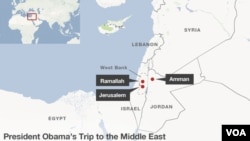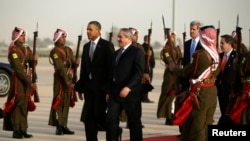JERUSALEM —
U.S. President Barack Obama says there is not much difference between U.S. and Israeli assessments of how close Iran is to potentially developing a nuclear weapon.
Speaking alongside Israel's Prime Minister Benjamin Netanyahu in Jerusalem Wednesday on the first day of a four-day Middle East trip, Obama said he would not expect his host to defer any decisions about military action to another country - even a close ally such as the United States. He repeated the U.S. position that "all options" are on the table for stopping Iran from acquiring a nuclear weapon but said there is still time to resolve the issue diplomatically.
Israel sees an Iranian nuclear weapon as a threat to its existence due to Tehran's calls for the destruction of the Jewish state. Iran insists that its nuclear program is designed only for peaceful research and electricity generation.
Netanyahu said he and Obama have a "common assessment" that it will take Iran about one year to make a nuclear bomb if it decides to do so. He said Iran's continued enrichment of uranium, a key ingredient of such a bomb, is a separate matter.
The Israeli prime minister said he believes that if Iran "gets through" the enrichment process, it will reach an "immunity zone" - a reference to a situation in which military action would not be able to stop it. In a speech to the United Nations last September, Mr. Netanyahu warned that Iran could reach such a "red line" by the middle of this year.
It was not clear if Obama shared the Israeli leader's view of the "immunity zone."
U.S., Israel Hail Alliance
Earlier, Obama and Israeli leaders reaffirmed the strength of the U.S.-Israel security relationship.
Obama received a full ceremonial welcome at Tel Aviv's Ben Gurion Airport, embracing Netanyahu and President Shimon Peres, and reviewing a military honor guard.
"Across this region, the winds of change bring both promise and peril. So I see this visit as an opportunity, to reaffirm the unbreakable bond between our nations, to re-state America's unwavering commitment to Israel's security, and to speak directly to the people of Israel and to your neighbors," Obama said, explaining why he made Israel the first stop of the first overseas trip of his second term.
Netanyahu said the need for the U.S.-Israel alliance is greater than ever amid unpredictable changes in the Middle East, adding Israel continues to seek peace with Palestinians.
"In an unstable and uncertain Middle East, the need for our alliance is greater than ever," he said. "It is the key to thwarting dangers to advancing peace. It's the key to achieve a stable and secure peace that the people of Israel yearn for all our neighbors, and with all our hearts. We seek a peace with our Palestinian neighbors."
Iron Dome
Obama also inspected a missile battery and other equipment, part of the Iron Dome defense system Israel built with U.S. aid, and has used to shoot down missiles fired from Hamas-ruled Gaza.
Later in Jerusalem, Obama said his talks with Peres focused on shared concerns about Iran's nuclear program and stalled Israeli-Palestinian peace efforts.
"Today was another opportunity for me to benefit from the president's perspective on a whole range of topics, from the historic changes that are taking place across the region, to the perils of a nuclear-armed Iran, to the imperatives of peace between Israelis and Palestinians to the promise of our digital age," Obama said.
Iran
Peres spoke of what he called a common U.S.-Israeli vision to confront dangers, and spoke about Iran.
"The greatest danger is a nuclear Iran. So you said, so you do. We trust your policy which calls to try by non-military means with a clear statement that both other options remain on the table," he said. "You have made it clear that your intention is not to contain, but to prevent."
Peres reaffirmed Israel's commitment to a two-state solution to the conflict with Palestinians, but called Hamas in Gaza a terrorist organization that continues to target innocent civilians.
The Israeli president said chemical weapons in the hands of the Syrian government cannot be allowed to fall into the hands of terrorist groups, which he said would be an "epic tragedy."
On Thursday, Obama meets Palestinian Authority President Mahmoud Abbas in Ramallah in the occupied West Bank.
Interactive Timeline
Speaking alongside Israel's Prime Minister Benjamin Netanyahu in Jerusalem Wednesday on the first day of a four-day Middle East trip, Obama said he would not expect his host to defer any decisions about military action to another country - even a close ally such as the United States. He repeated the U.S. position that "all options" are on the table for stopping Iran from acquiring a nuclear weapon but said there is still time to resolve the issue diplomatically.
Israel sees an Iranian nuclear weapon as a threat to its existence due to Tehran's calls for the destruction of the Jewish state. Iran insists that its nuclear program is designed only for peaceful research and electricity generation.
Netanyahu said he and Obama have a "common assessment" that it will take Iran about one year to make a nuclear bomb if it decides to do so. He said Iran's continued enrichment of uranium, a key ingredient of such a bomb, is a separate matter.
The Israeli prime minister said he believes that if Iran "gets through" the enrichment process, it will reach an "immunity zone" - a reference to a situation in which military action would not be able to stop it. In a speech to the United Nations last September, Mr. Netanyahu warned that Iran could reach such a "red line" by the middle of this year.
It was not clear if Obama shared the Israeli leader's view of the "immunity zone."
U.S., Israel Hail Alliance
Earlier, Obama and Israeli leaders reaffirmed the strength of the U.S.-Israel security relationship.
Obama received a full ceremonial welcome at Tel Aviv's Ben Gurion Airport, embracing Netanyahu and President Shimon Peres, and reviewing a military honor guard.
"Across this region, the winds of change bring both promise and peril. So I see this visit as an opportunity, to reaffirm the unbreakable bond between our nations, to re-state America's unwavering commitment to Israel's security, and to speak directly to the people of Israel and to your neighbors," Obama said, explaining why he made Israel the first stop of the first overseas trip of his second term.
Netanyahu said the need for the U.S.-Israel alliance is greater than ever amid unpredictable changes in the Middle East, adding Israel continues to seek peace with Palestinians.
"In an unstable and uncertain Middle East, the need for our alliance is greater than ever," he said. "It is the key to thwarting dangers to advancing peace. It's the key to achieve a stable and secure peace that the people of Israel yearn for all our neighbors, and with all our hearts. We seek a peace with our Palestinian neighbors."
Iron Dome
Obama also inspected a missile battery and other equipment, part of the Iron Dome defense system Israel built with U.S. aid, and has used to shoot down missiles fired from Hamas-ruled Gaza.
Later in Jerusalem, Obama said his talks with Peres focused on shared concerns about Iran's nuclear program and stalled Israeli-Palestinian peace efforts.
"Today was another opportunity for me to benefit from the president's perspective on a whole range of topics, from the historic changes that are taking place across the region, to the perils of a nuclear-armed Iran, to the imperatives of peace between Israelis and Palestinians to the promise of our digital age," Obama said.
Iran
Peres spoke of what he called a common U.S.-Israeli vision to confront dangers, and spoke about Iran.
"The greatest danger is a nuclear Iran. So you said, so you do. We trust your policy which calls to try by non-military means with a clear statement that both other options remain on the table," he said. "You have made it clear that your intention is not to contain, but to prevent."
Peres reaffirmed Israel's commitment to a two-state solution to the conflict with Palestinians, but called Hamas in Gaza a terrorist organization that continues to target innocent civilians.
The Israeli president said chemical weapons in the hands of the Syrian government cannot be allowed to fall into the hands of terrorist groups, which he said would be an "epic tragedy."
On Thursday, Obama meets Palestinian Authority President Mahmoud Abbas in Ramallah in the occupied West Bank.
Interactive Timeline








